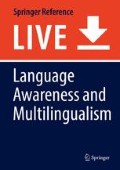Abstract
Interest in language awareness or knowledge about language has grown over the last 20 years, mainly stimulated by the language awareness movement in the UK. A literature survey reveals considerable discrepancies in definition and terminology (language awareness, metalinguistic awareness, linguistic awareness, etc.), and the reasons seem to be linked to the vast theoretical scope of the field with studies stemming from linguistics, developmental psychology, and education. The growing interest in multilingualism has given rise to a wave of research emphasis on the role of language awareness in multilingual learning and education.
In the following sections, the various strands of research, from their beginnings to their current works, and problems in the field – with regard to terminological confusion and various dichotomies in relation to the consciousness debate – will be discussed. In the final section, challenges for future studies on language awareness in multilingualism will be presented.
References
Baker, C. (2011). Foundations of bilingualism and bilingual education (5th ed.). Clevedon: Multilingual Matters.
Ben-Zeev, S. (1977). Mechanisms by which childhood bilingualism affects understanding of language and cognitive structures. In P. Hornsby (Ed.), Bilingualism: Psychological, social, and educational implications (pp. 29–55). New York: Academic.
Bialystok, E. (2011). The good, the bad and the indifferent. Bilingualism: Language and Cognition, 12, 3–11.
Bialystok, E., Craik, F., Klein, R., & Viswanathan, M. (2004). Bilingualism, aging, and cognitive control: Evidence from the Simon task. Psychology and Aging, 19, 290–303.
Birdsong, D. (1989). Metalinguistic performance and interlinguistic competence. Berlin: Springer.
Bono, M., & Stratilaki, S. (2009). The M-factor, a bilingual asset for plurilinguals? Learners’ representations, discourse strategies and third language acquisition in institutional contexts. International Journal of Multilingualism, 6, 207–227.
Candelier, M. (2003). Evlang – l’Eveil aux Langues á l’Ecole Primaire. Bruxelles: De Boeck-Duculot.
Cenoz, J. (2009). Towards multilingual education. Basque educational research from an international perspective. Bristol: Multilingual Matters.
Cook, V. (2002). Background to the L2 user. In V. Cook (Ed.), Portraits of the L2 user (pp. 1–28). Clevedon: Multilingual Matters.
Ellis, R. (1994). The study of second language acquisition. Oxford: Oxford University Press.
Gombert, E. (1992). Metalinguistic development in first language acquisition. In L. van Lier & D. Corson (Eds.), Knowledge about Language (Encyclopedia of language and education, Vol. 6, pp. 43–51). Dordrecht: Kluwer.
Grosjean, F. (2001). The bilingual’s language modes. In J. Nicol (Ed.), One mind, two languages: Bilingual language processing (pp. 1–22). Oxford: Blackwell.
Hamers, J., & Blanc, M. (1989). Bilinguality and bilingualism. Cambridge: Cambridge University Press.
Hawkins, E. (1999). Foreign language study and language awareness. Language Awareness, 3&4, 124–142.
Herdina, P., & Jessner, U. (2002). A dynamic model of multilingualism: Perspectives of change in psycholinguistics. Clevedon: Multilingual Matters.
Hufeisen, B., & Neuner, G. (Eds.). (2003). Mehrsprachigkeitskonzept – Tertiärsprachen – Deutsch nach Englisch. Straßbourg: Council of Europe Publishing.
Ianco-Worrall, A. (1972). Bilingualism and cognitive development. Child Development, 43, 1390–1400.
James, C. (1996). A cross-linguistic approach to language awareness. Language Awareness, 5, 138–148.
James, C. (1999). Language awareness: Implications for the language curriculum. Language, Culture and Curriculum, 12, 94–115.
Jessner, U. (2006). Linguistic awareness in multilinguals: English as a third language. Edinburgh: Edinburgh University Press.
Jessner, U. (2014). On multilingual awareness or why the multilingual learner is a specific language learner. In M. Pawlak & L. Aronin (Eds.), Essential topics in applied linguistics and multilingualism: Studies in honor of David Singleton (pp. 175–184). Berlin: Springer.
Karmiloff-Smith, A. (1992). Beyond modularity: A developmental perspective on cognitive science. Cambridge, MA: MIT Press.
Krashen, S. (1982). Principles and practices in second language acquisition. Oxford: Pergamon.
Kroll, J., & Bialystok, E. (2013). Understanding the consequences of bilingualism for language processing and cognition. Journal of Cognitive Psychology, 25, 497–514.
Leopold, W. (1939–1949). Speech development of a bilingual child: A linguist’s record (4 vols.). Evanston: Northwestern University Press.
Malakoff, M., & Hakuta, K. (1991). Translation skill and metalinguistic awareness in bilinguals. In E. Bialystok (Ed.), Language processing in bilingual children (pp. 141–166). Cambridge: Cambridge University Press.
Mohanty, A. (1994). Bilingualism in a multilingual society: Psychosocial and pedagogical implications. Mysore: Central Institute of Indian Languages.
Otwinoska, A., & De Angelis, G. (Eds.). (2014). Teaching and learning in multilingual contexts: Sociolinguistic and educational perspectives. Bristol: Multilingual Matters.
Peal, E., & Lambert, W. (1962). The relation of bilingualism to intelligence. Psychological Monographs, 76, 1–23.
Pinto, M. A., Titone, R., & Trusso, F. (1999). Metalinguistic awareness: Theory, development and measurement instruments. Pisa/Rome: Istituti Editoriali e Poligrafici Internazionali.
Safont-Jordà, M. P. (2013). Early stages of trilingual pragmatic development: A longitudinal study of requests in Catalan, Spanish and English. Journal of Pragmatics, 59, 68–80.
Schmidt, R. (1994). Deconstructing consciousness in search of useful definitions for applied linguistics. AILA Review, 11, 11–26.
Singleton, D., & Munoz, C. (2011). A critical review of age-related research on L2-attainment. Language Teaching, 44, 1–35.
Swain, M. (1995). Three functions of output in second language learning. In G. Cook & B. Seidlhofer (Eds.), Principles and practices in applied linguistics: Studies in honour of H.G. Widdowson (pp. 125–144). Oxford: Oxford University Press.
Van Essen, A. (1997). Language awareness and knowledge about language: An overview. In L. van Lier & D. Corson (Eds.), Knowledge about language (Encyclopedia of Language and Education, vol. 6, pp. 1–9). Kluwer: Dordrecht.
Vygotsky, L. (1986, 1934). In A. Kozulin (Ed.), Thought and language. Cambridge, MA: MIT Press.
Author information
Authors and Affiliations
Corresponding author
Editor information
Editors and Affiliations
Rights and permissions
Copyright information
© 2015 Springer International Publishing Switzerland
About this entry
Cite this entry
Jessner, U. (2015). Language Awareness in Multilinguals: Theoretical Trends. In: Cenoz, J., Gorter, D., May, S. (eds) Language Awareness and Multilingualism. Encyclopedia of Language and Education. Springer, Cham. https://doi.org/10.1007/978-3-319-02325-0_28-1
Download citation
DOI: https://doi.org/10.1007/978-3-319-02325-0_28-1
Received:
Accepted:
Published:
Publisher Name: Springer, Cham
Online ISBN: 978-3-319-02325-0
eBook Packages: Springer Reference EducationReference Module Humanities and Social SciencesReference Module Education

